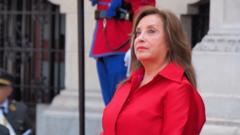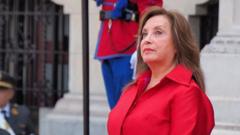South Korea's Constitutional Court has officially removed President Yoon Suk Yeol from office, marking a significant political shift after a controversial six-hour martial law in December. This ruling has been celebrated by public demonstrators who had long sought Yoon's ouster, amid accusations of betrayal and legal violations.
South Korea's Constitutional Court Ousts President Yoon Suk Yeol Amid Public Outcry

South Korea's Constitutional Court Ousts President Yoon Suk Yeol Amid Public Outcry
The Constitutional Court has upheld the impeachment of President Yoon Suk Yeol, causing celebrations among protesters who demanded his removal after a failed martial law declaration.
South Korea's Constitutional Court has delivered a decisive blow to President Yoon Suk Yeol by upholding his impeachment, effectively ending his presidency just four months after he controversially declared martial law on December 3. The court's ruling was met with jubilation from thousands of demonstrators, as protesters celebrated their victory by waving flags and cheering in the streets of Seoul, a city that has been a battleground between supporters and opponents of Yoon for weeks.
The court session began at 11 a.m. local time when Acting Chief Justice Moon Hyungbae commenced the reading of their unanimous decision to remove Yoon, announcing that all eight justices had cast votes in favor of impeachment. The ruling stated that Yoon had "betrayed the trust of the people" and had "seriously violated the law." The decision is effective immediately and cannot be appealed, leaving the People Power Party, of which Yoon is a member, to acknowledge the court’s ruling with a statement of acceptance.
Yoon's impeachment has its roots in a dramatic sequence of events that unfolded on December 3, when he abruptly declared martial law during a tense political climate. The declaration was short-lived, lasting only six hours, as lawmakers swiftly voted to overturn it. Following Yoon's televised announcement, military forces aggressively occupied the National Assembly, dispatched by the president to thwart legislative voting. Citizens responded by confronting troops while some lawmakers found their way into the assembly, leading to intense confrontations.
In delivering the court’s rationale, Justice Moon emphasized that Yoon's declaration of martial law did not align with constitutional criteria for an emergency, contradicting Yoon's assertions made at the time. This ruling marks a turning point in South Korea's political landscape, showcasing the power of public dissent and judicial review in holding leadership accountable.






















